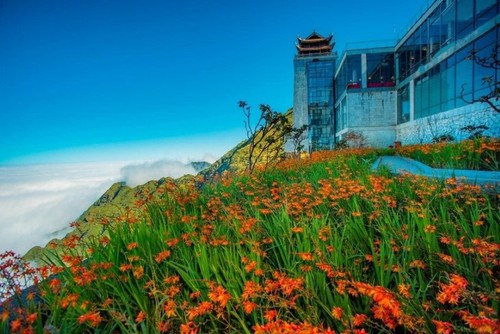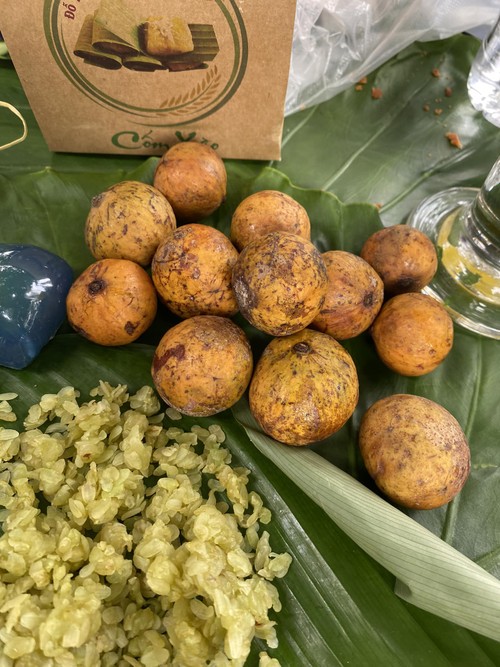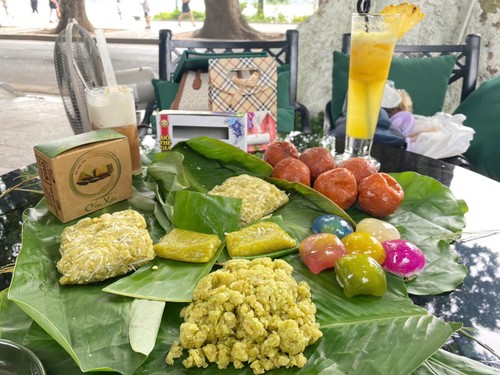 Crocosmia flowers bloom in brilliant red on Mount Fansipan Crocosmia flowers bloom in brilliant red on Mount Fansipan
|
B: Minlin from Kalimantan Barat, Indonesia, conveyed his congratulations upon hearing the news of President To Lam being elected as General Secretary of the Communist Party of Vietnam. Minlin wrote he hopes that Vietnam will continue to achieve remarkable progress across the fields.
A: This week, many Chinese listeners shared their interest in the 25th anniversary of the Vietnam-China Land Border Treaty, emphasizing the enduring friendship between the two nations.
B: In Tarragona, Spain, Juan Franco Crespo shared his admiration for the Vietnam Press Museum. He congratulated us on our achievements, particularly in winning awards, and expressed his appreciation for the work we do.
A: Another Spaniard named Juan Carlos Pérez Montero fondly recalled his passion for shortwave radio. Despite the sweltering heat of this August, he remains committed to his hobby, regularly sending us his reception reports.
B: In his email to VOV this week Vicentiu Daniel Gheorghe of Romania discussed Vietnam’s renewal process and its long-term impact on Vietnam's development and President Ho Chi Minh whom he described as the architect of Vietnamese independence.
A: Meanwhile, José Ignacio Cos Lezama of Spain, offered his reflections on Vietnam’s longstanding tradition of honoring President Ho Chi Minh, as well as the country’s commemoration of wounded soldiers and martyrs. “This is a wonderful gesture that must continue no matter what happens,” he remarked.
B: Listeners from Japan, too, have shown a keen interest in Vietnam. Harada Ryosuke asked about Hanoi's autumn specialties as he is eager to learn more about the unique flavors of the season.
A: Hanoi's autumn is a magical time when the city comes alive with the vibrant colors of falling leaves and the crisp, cool air. But beyond the picturesque scenery, it's also a season filled with unique culinary delights that capture the essence of the city.
 Cốm or young green sticky rice and Sấu chín or ripe Dracontomelon are among Hanoi's autumn specialties (Photo: Cam Thi) Cốm or young green sticky rice and Sấu chín or ripe Dracontomelon are among Hanoi's autumn specialties (Photo: Cam Thi) |
B: Cốm is perhaps the most iconic of all Hanoi's autumn treats. Made from young, green rice harvested just before it fully matures, cốm is lightly roasted and flattened into soft, chewy flakes. It's often wrapped in lotus leaves, which impart a subtle fragrance.
A: Young green sticky rice from the villages of Vong and Me Tri on the outskirts of Hanoi is the most sought-after. The method of making young green sticky rice is still guarded as a family secret. Tran Thi Tham, whose family has been producing young green sticky rice for four generations, describes the process of making Com in her home village of Me Tri.
Tham said: “Only experienced farmers know the right time to pick the young rice to make Com. When the glutinous rice ears bend themselves into arches, the farmers will pick and bite on some of the grains. If they taste as sweet as milk, then it’s the right time to harvest the young rice. Harvesting should be completed in two days so the young rice will not grow older. Older rice does not have a nice green color.”
 (Photo: Cam Thi) (Photo: Cam Thi) |
B: The farmers have to harvest young green glutinous rice very early, at 3am. The process of turning young sticky rice into Com is complicated and meticulous, says Tham.
“After harvesting, the young green sticky rice is put into a large cast-iron pan and roasted slowly for two hours. If you use a pan made from aluminum or steel, the young sticky rice will turn brown. It is important to keep the right temperature. Then the roasted grains are put through a husking machine. This is repeated 15 times so that the husk is removed from the grains. Finally, the grains are placed in a rice mortar and gently pounded with a wooden pestle," according to Tham.
A: Tham said that there are many types of young green sticky rice available in the market: “There are two types of young green sticky rice that are the best. They are “Cốm lá me” and “Cốm giót”. Another one is “Cốm xào”. When you screen the rice, “Cốm lá me” will fly up and drop into the large basket placed below, while “Cốm giót” will stay on the screen and stick together, forming many tiny rice balls. “Com la me” is suitable for storing while “Cốm giót” should be eaten within a day. “Cốm xào” consists of older grains, which command a cheaper price.”
B: Young green sticky rice is the main ingredient of both sweet and savory Vietnamese dishes, including “Cha com” (pork paste with young green sticky rice), “Che com” (sweetened green sticky rice), and “Banh com” (sticky rice cake), and fusion desserts like ice cream and mochi.
A: Talking about specialties of Hanoi’s autumn, we must include ripe Dracontomelon or Sấu which is a fruit that grows abundantly in Hanoi, especially during autumn. While it's often used in its unripe form to add a tart flavor to soups and stews, in Autumn, the ripe sấu is a popular snack. The ripe fruit is often soaked in sugar syrup, creating a sweet and tangy treat that's both refreshing and nostalgic for many Hanoians.
B: Although mooncakes are associated with the Mid-Autumn Festival, they are an essential part of Hanoi's autumn food culture. These dense, rich pastries come in various flavors, including traditional fillings like lotus seed paste, mung bean, and salted egg yolk. Nowadays, modern variations with flavors like green tea, durian, and chocolate are also popular.
A: Hanoi’s autumn specialties reflect the city's deep connection to the seasons and its rich culinary traditions. These dishes not only satisfy the palate but also evoke memories of Hanoi's streets, with their golden leaves and cool breezes.
B: In his email to VOVWorld this week Juan Diez of Spain highlighted the recognition of Vietnam as a market economy by Manuel Tovar, Costa Rica's Minister of Foreign Trade. He emphasized the significance of this acknowledgment from an economically advanced Central American nation and expressed his hopes for the flourishing economic ties between Vietnam and Costa Rica.
A: Evgeny of Russia praised our coverage of international news and the insightful articles about ethnic minority cultures in Vietnam. His words reflect the appreciation many feel for the rich cultural diversity shared through our broadcasts.
A: We’d like to acknowledge the letters from Bidhan Chandra Sanyal, Najimuddin, and Sanil Deep of India, Kobayashi Hideyuki of Japan, Ben of Laos, Tarana Tinni of Bangladesh, and many others.
B: As we listen to these voices from around the world, we are reminded of the strong connections our broadcasts help to create. Whether it’s a letter from a small town or a comment on social media, each message is a source of encouragement for us amid the rapid development of global communication. We are grateful for the continued support and curiosity of our listeners and look forward to sharing more stories and insights from Vietnam with you all.
A: Thank you all for your interest in VOV. We welcome your feedback at English Service, VOVWORLD, the Voice of Vietnam, 45 Ba Trieu Street, Hanoi, Vietnam. Or you can email us at englishsection@vov.vn. You’re invited to visit us online at vovworld.vn, where you can hear both live and recorded programs. Once again, thank you all for listening. Goodbye!